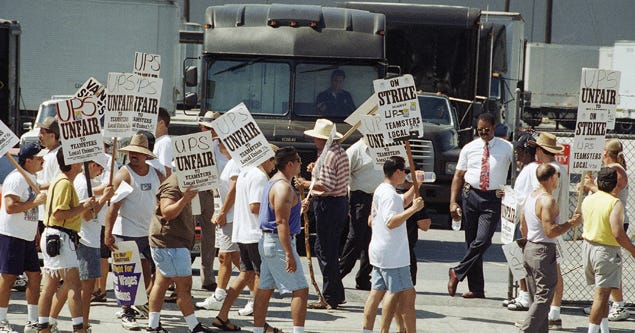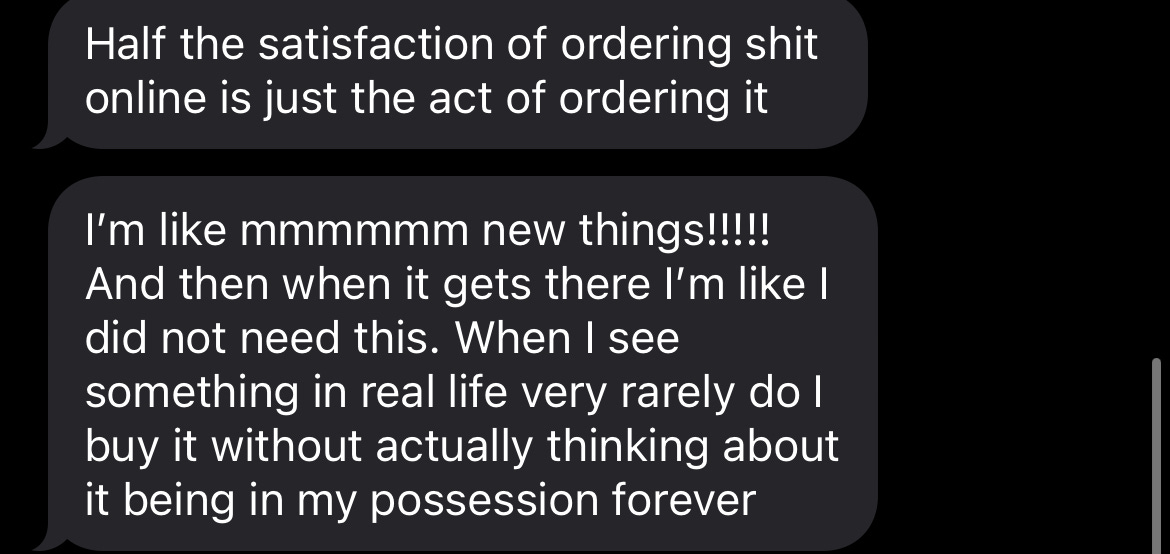How bad do you really need it?
Is overnight and same day shipping killing our relationship with our stuff?
Hi everyone! Welcome back to MY OWN SUMMER, my semi-regular newsletter. I hope you had a wonderful New Years, and I hope your ins and outs are slowly coming true.

This week, I read a fantastic piece in the New Yorker about a looming UPS workers strike. New Yorker staff writer Jennifer Gonnerman followed Antoine Andrews, a UPS driver in Brooklyn, as his union, International Brotherhood of Teamsters Local 408, prepares for a possible strike this summer if contract negotiations with UPS fall through. Gonnerman highlights yet another industry that’s critical to the basic functioning of our economy that also fails to, you know, pay the people that actually make it happen a livable wage.
While reading, I started thinking about our relationship to our stuff and how we get it. Like most people, I buy my things (food, electronics, clothes, knicknacks, doodads, bobbles, trinkets etc) both online and in-store. Since I sold my car in October of last year, I’ve had to supplement some of my shopping habits with more online purchases, such as ordering grocery delivery for stuff I can’t carry easily. I’m not alone; Americans be shopping. In 2022, revenue from e-commerce sales was over 900 billion dollars. Amazon, who has pioneered ways to have stuff delivered to you before you even know you want it,
has a whopping 56.7% share of those sales. That puts pressure on traditional package delivery companies like UPS to pick up the pace of deliveries. The piece quotes Vinnie Peronne, I.B.T Local 408’s president, about the rise of Amazon Flex drivers, Uber-style gig workers who use their own cars to deliver Amazon packages:
[Amazon Flex] has made it difficult for UPS, with its full-time drivers and regular start times, to keep up. Perrone told me that he recently saw an Amazon Flex driver delivering a package to a neighbor’s house at 5:45 a.m. “People are waking up to packages on their front doorstep,” he said. He imagined what might be going through the minds of UPS executives: “How can we compete with this nonsense?”
This got me thinking about how much I participate in this “nonsense”. During a recent bus commute, my phone battery was about to die. I realized that I should start bringing a portable charger with me on my longer commutes, so I used my last 2% to order a portable battery with same day delivery. Sure enough, when I got home, my package had arrived. Because Houston is one of the larger cities where Amazon offers same day and overnight delivery, I can now get pretty much anything I want delivered to me faster than I can think about how bad I actually want it. I’ve had things like stationery, phone chargers, a new pillow and even a bidet ordered this way (the bidet exploded in my apartment and went back to Amazon).
Contrast this with another recent purchase - a used 2005 iPod Classic 5th generation that I bought on eBay (we’ll touch on this in an upcoming post). eBay advised me that it would arrive on Friday the 13th, but it hasn’t arrived. USPS says that it’s currently sitting in a postal facility in Pensacola, Florida. I know that it’ll show up eventually, and that an MP3 player that’s nearly 20 years old is not something that I need urgently. Just the same, I can’t stop checking the tracking information obsessively. It’s an annoyance to be sure, but it’s also a sign of how much e-commerce has changed our expecations, our patience, and our shopping habits. There was a time when a one week delivery was considered the standard, and getting something you bought online the same day seemed like a far off possibility. Now, Amazon is the rule, not the exception. Amazon Prime has spoiled us with the thing we humans love: instant gratification.
In my never ending quest to play Carrie Bradshaw, I picked a few friends’ brains about why we like to online shop. My friend Deja offered up one explanation:
Online shopping, to me, feels like buying a present for yourself, even if it’s something mundane like new razors or a textbook for class. Opening your new stuff is an event to look forward to when you get home, and you get a quick hit of dopamine from unwrapping it. It’s a great feeling, but it never lasts very long, and depending on how bad your shopping addiction is, the cycle quickly repeats itself. Now that it’s open and in your hands, the thing that you saw on the computer now has to go somewhere in your home. It has to take up space and coexist not only with all of your other baubles, but with you as well. Like a stray you took in, the ANGTUO Wooden Mushroom Lamp Baby Night Light for Kids with 16 Color Changing and Dimmable Nursery Lamp Bedside Light for Breastfeeding Baby Bedroom is now part of your life.
Contrast this to buying stuff in person. It’s agonizing, and suddenly your money is very real. Spending $40 online is easy enough, but when you’re faced with a decision in the real world, you suddenly start thinking about how much $40 really is. You worked long hours at your email job to get that stuff. Will it go with the vibe of your place? Will your other things appreciate it? Will you actually even use it? I think the pause that comes from brick-and-mortar shopping is generally a good thing. I’m by no means a minimalist. I think your space should be full of things you like that reflect your personality. It should be devoid of junk.
JUNK
/jəNGk/
noun
1.INFORMALold or discarded articles that are considered useless or of little value."the cellars are full of junk"
What is junk? Go on Amazon and type in pretty much anything you can think of. You’ll see pages upon pages of low quality, mass produced stuff that is a carbon copy of other stuff. These things are fine in a pinch. A battery bank, a memory foam pillow, a hand mixer. All things that will work when you need them to. But what aesthetic purpose do they serve in our lives besides functionality? What greater niche is filled by plastic junk that leaves our lives just as quickly as it entered? When I can order a bidet, have it come fast only to not work, and send it back the next day like it never was there in the first place, it feels like I did something wrong. Do that over and over, and it starts to feel like online shopping has created a throwaway culture, where we buy things with our hard earned money that we don’t really value.
Your cellphone is a good example of this. Think about the phone you’re reading this article on right now. Do you really like it, value it, and appreciate what it brings to your life? Or does it serve its purpose until you get the next upgrade? I’m willing to bet it’s partly the latter. Couple that with planned obsolesence, the ubiquity of cheap semiconductors and electronics, and the fact that a new iPhone seems to come out every year, and you get a world where 50 million tons of e-waste are produced each year.
I don’t think any of this necessarily means we should stop online shopping. We should shop purposefully, spending money on things that will enhance our lives or make us genuinely happy instead of giving us another dopamine hit. Spend money on used things, buy in person when you can, and decide if you really need that mushroom lamp delivered right to your door. Most importantly, remember the human aspect. A robot isn’t delivering your things; it’s a real flesh and blood person, often working for low wages in inhumane conditions. It’s our duty to shop smarter and more responsibly, if not for yourself, then for them.
What’s good? This video of David Bowie and Trent Rezor dueting “Hurt” in 1994 is crazy good.
If you like my work, please consider subscribing to my newsletter. It’s my creative outlet, and it makes me very happy when I get a little notification that you subscribed! Consider sharing this article with a friend, too.

